Urban Natural Assets (UNA) for Africa:
Handbook series
Explore and view the UNA handbook series below
The ICLEI Cities Biodiversity Center, a global centre hosted by ICLEI Africa, developed this handbook series to showcase key considerations for integrating urban natural assets into city planning in sub-Saharan Africa. All lessons profiled were gathered through the implementation of the UNA programme.
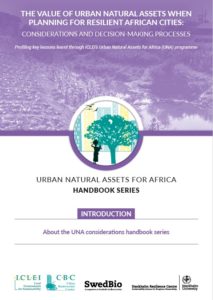
To fully benefit from all the learnings outlined in the below handbooks, it’s important to be familiar with the challenges facing African cities and the realities and opportunities associated with working in this unique context.
As the 21st century will bring many challenges, officials and planners in Africa will need to focus their energy on developing sustainable, climate-resilient cities. Central to this task is the safeguarding of biodiversity, as urban natural assets provide a wide range of basic goods and services that support the health and well-being of city residents, and of society as a whole. They also afford benefits that help to build a city’s resilience to risks associated with climate change.
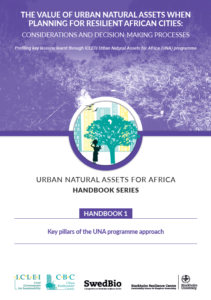
Handbook 1
Key pillars of the UNA programme approach
Handbook 1 sheds light on the Key pillars of the UNA programme approach.
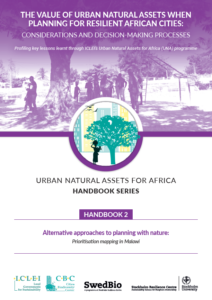
Handbook 2
Alternative approaches to planning with nature: Prioritisation mapping in Malawi
Handbook 2 discusses alternative approaches to planning with nature in cities, using prioritisation mapping in Malawi as a case study.
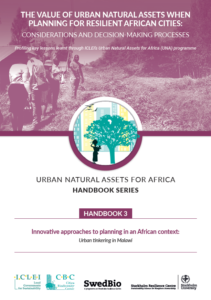
Handbook 3
Innovative approaches to planning in an African context: Urban tinkering in Malawi
Handbook 3 discusses Innovative approaches to planning in an African context using urban tinkering in Malawi as a case study.
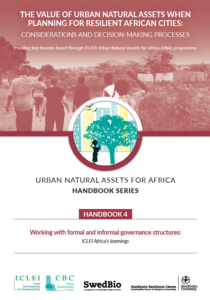
Handbook 4
Working with formal and informal governance structures: ICLEI Africa’s learnings
Handbook 4 discusses working with formal and informal governance structures in cities.
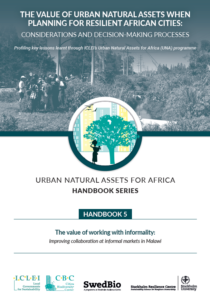
Handbook 5
The value of working with informality: Improving collaboration at informal markets in Malawi
Handbook 5 discusses the value of working with informality by using Malawi as a case study.
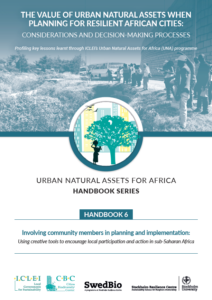
Handbook 6
Involving community members in planning and implementation: Using creative tools to encourage local participation and action in sub-Saharan Africa
Handbook 6 unpacks involving community members in planning and implementation in Africa.
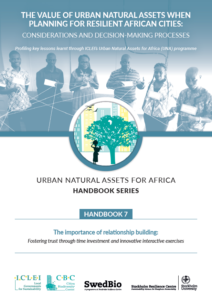
Handbook 7
The importance of relationship building: Fostering trust through time investment and innovative interactive exercises
Handbook 7 highlights the importance of relationship building and how trust can be built through time investment and innovative interactive exercises.
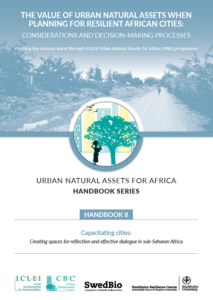
Handbook 8
Capacitating cities: Creating spaces for reflection and effective dialogue in sub-Saharan Africa
Handbook 8 sheds light on capacitating cities.
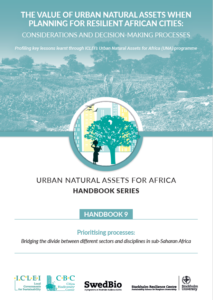
Handbook 9
Prioritising processes: Bridging the divide between different sectors and disciplines in sub-Saharan Africa
Handbook 9 discusses prioritising processes.
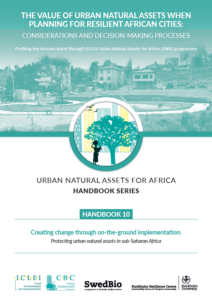
Handbook 10
Creating change through on-the-ground implementation: Protecting urban natural assets in sub-Saharan Africa
Handbook 10 discusses creating change through on-the-ground implementation.
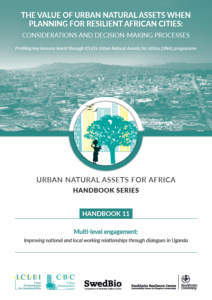
Handbook 11
Multi-level engagement: Improving national and local working relationships through dialogues in Uganda
Handbook 11 sheds light on multi-level engagements, using Uganda as a case study.